Who is Tulsi Gabbard? The progressive 2020 hopeful praised by Bannon and the right

Congresswoman Tulsi Gabbard is not afraid to take a stand.
For a promising young Democrat in 2015, one of the seemingly worst places to be was on the wrong side of Hillary Clinton, who – barring some bizarre twist – was on her way to becoming America’s next president.
Yet Gabbard, then a 34-year-old second-term congresswoman from Hawaii with both combat experience and a radiant smile, had the temerity to cross Clinton by calling for additional debates between Clinton and her opponent in the Democratic primary race, Bernie Sanders.
Retribution was swift. Gabbard was kicked off the Democratic National Committee leadership and disinvited from the party’s first presidential debate. “It’s very dangerous when we have people in positions of leadership who use their power to try to quiet those who disagree with them,” she said at the time.
Related: Who is running for president? The full list of 2020 Democratic candidates
In retrospect, the clash clearly looks bad for the Democratic party, whose rush to nominate Clinton did not work out. But the conflict also scans as a red flag for Gabbard, whose defections would later multiply, establishing her independence but scrambling her political identity and fueling questions about her conservative past.
A 2020 candidate with some unusual stances
Gabbard’s ascent in national politics to that point had been seemingly frictionless. As an Iraq war veteran with progressive views on the economy and the environment, and more than a hint of glamour, Gabbard was seen by TV host Rachel Maddow as “on the fast track to being very famous” upon her election to Congress in 2012. A Vogue magazine profile the following year, titled “Making a Splash: Is Tulsi Gabbard the next Democratic party star?” hailed her as “an embodiment of the Obama era”.
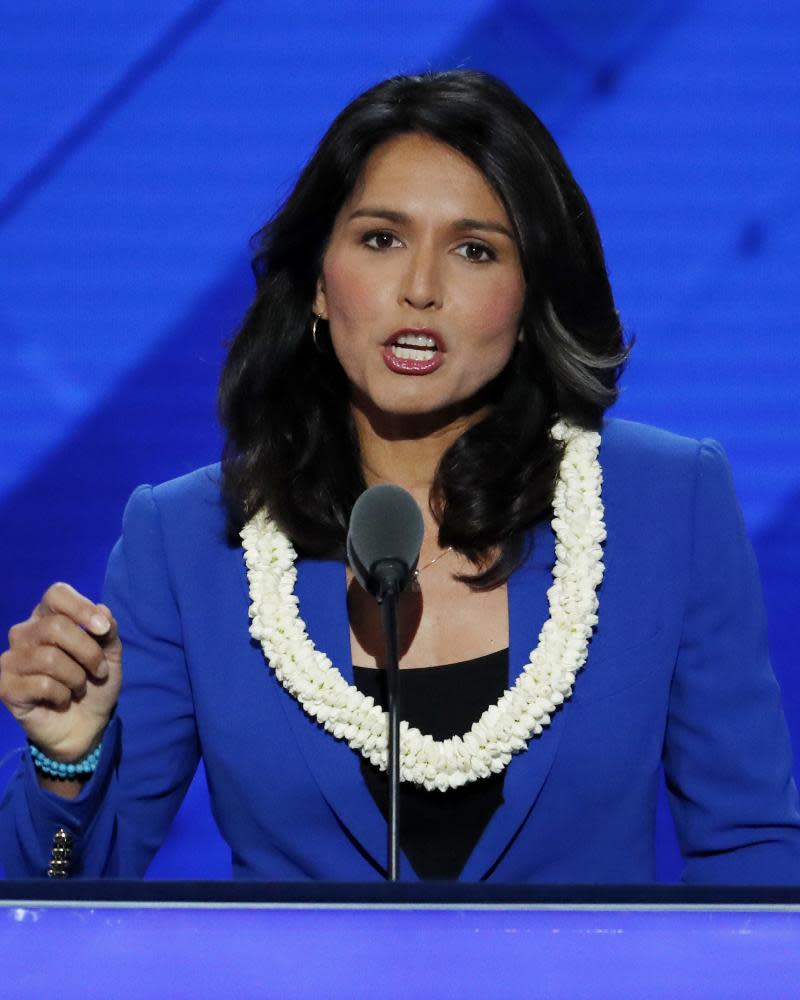
Tulsi Gabbard speaks at the 2016 Democratic national convention in Philadelphia.Photograph: J Scott Applewhite/AP
But lurking ahead for Gabbard were moments when her political instincts were tested and her judgment called into doubt. For all her talk of “spreading the aloha spirit” her career has been defined, in Washington and Hawaii, by a series of unexpected and difficult-to-explain conflicts with her supposed ideological allies. To her fellow Democrats, she has seemed both to pick the wrong fights (Clinton, Barack Obama, Democratic senators) and attract the wrong fans, from Fox News’ Tucker Carlson to the former Donald Trump aide Steve Bannon.
“He loves Tulsi Gabbard. Loves her,” the Hill newspaper quoted a Bannon associate as saying after Bannon arranged for Gabbard to meet Trump following the November 2016 election, a meeting that Gabbard later denied was a job interview. “Wants to work with her on everything.”
Fast-forward three years, and now Gabbard herself is running for president, on a platform that appears at a glance to match that of any other Democrat circa 2020: universal healthcare, a call to action on climate change, education reform, spending on infrastructure and jobs, and the decriminalization of marijuana.
But Gabbard’s other stances set her apart. She opposes military interventions abroad with a rare credibility of intent, even going so far, in arguing against foreign interventions, as to repeatedly cast doubt on the wealth of evidence that the Syrian dictator, Bashar al-Assad, used chemical weapons on his own people.
Related: Tulsi Gabbard: how a progressive rising star is a paradox for the left
She has staked out a split identity as both a foreign policy hawk (on “Islamic extremism”) and a dove (on “regime-change” wars). She has defended multiple Trump judicial nominees against questions by her fellow Democrats about their social views. She also has shown what some colleagues see as a Trump-like comfort with foreign dictators, including Assad, whom she met on a trip to Syria in 2017.
And she has strived to distance herself from a not-so-distant past as one of Hawaii’s most stringent anti-LGBT voices. She has been publicly disavowing that past since 2012, telling voters that she was raised in a “very socially conservative home”. It is an effort that some local activists today say falls short.
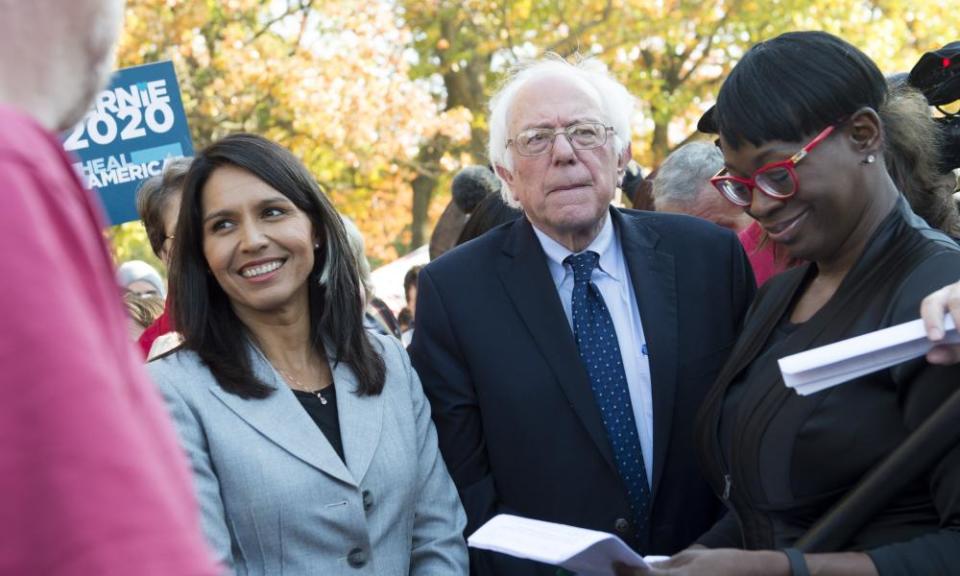
Bernie Sanders waits alongside Gabbard at a rally to stop the Trans-Pacific Partnership in Washington DC on 17 November 2016.Photograph: Saul Loeb/AFP/Getty Images
“I was raised to believe that if you’ve done harm to somebody – and as much harm as she and her family have done – she has to take ownership of that, because she rose to power on that last name as well,” said Michael Golojuch Jr, a Honolulu-based activist and longtime critic of Gabbard.
“That name became a household name because of their hatred toward the LGBTQIA community. You have to do something to make up for the bad you’ve done. And all she’s done is say: ‘Oh, I’ve changed!’”
Neither Gabbard’s 2020 campaign nor her congressional office responded to requests for comment for this article, including detailed questions about her record on LGBT issues.
Gabbard has taken many stands in the past. As she sets her sights on the White House, it’s an open question whether some of those stands might now emerge as stumbling blocks.
‘She’s a very charismatic politician’
Among presidential candidates, Gabbard is a pioneer with a unique life story – as much as Barack Obama was when he first emerged on the national scene.
Both Obama and Gabbard grew up in Hawaii. Both had mothers from the midwest – Obama’s from Kansas, Gabbard’s from Michigan. But while Obama’s father was African, Gabbard’s father, a polarizing local Hawaiian politician named Mike Gabbard, grew up in American Samoa, the tiny US territory in the South Pacific Ocean, where Tulsi Gabbard and her four siblings were born. She is the first American Samoan and the first Hindu member of the US Congress, and she was the first representative to be sworn in on the Bhagavad Gita.
As a child, Gabbard, who turns 38 next month, was part of a religious community centered around the teachings of the spiritual leader Chris Butler, a Hindu philosopher with links to the Hare Krishna movement who as early as 1970 was treated in the local Hawaiian press as a hippie guru and whose Science of Identity Foundation remains active worldwide.
Related: Tulsi Gabbard: is the Iraq war veteran 2020's most divisive candidate?
Gabbard has downplayed the association, telling the New Yorker magazine in 2017 that “I’ve had many different spiritual teachers, and continue to.” But her ties to the Butler community, from her family to her donor network, run deep, and since her election to Congress she has referred to Butler has her “guru dev”, or spiritual guide.
Gabbard’s father, who identifies as Catholic, and mother, a Hindu convert from Methodist Christianity, home-schooled their children. “They gave all their children staunchly Hindu names,” Gabbard told the Indo American News before her first run for Congress, “and raised us as Hindus and vegetarians”. She describes being shy as a child, studying martial arts and learning to surf.
Gabbard’s political career sprouted unusually early. At 21, she became the youngest-ever member of the Hawaiian state legislature, foreshadowing victories in a 10-person primary field for the Honolulu city council and, later, over a popular former Honolulu mayor in her first congressional race.
“She’s a very charismatic politician, and that’s always been a big advantage for her, and has allowed her to win victories in Hawaii,” said Colin Moore, a professor of political science at the University of Hawaii. Moore said Gabbard remained popular locally, “particularly on the neighbor islands [outside Oahu], I think in part because of her iconoclastic views on a lot of things, and because I think people feel like she stands up to the power structure in Washington and to some extent the Democratic machine here in Hawaii.”
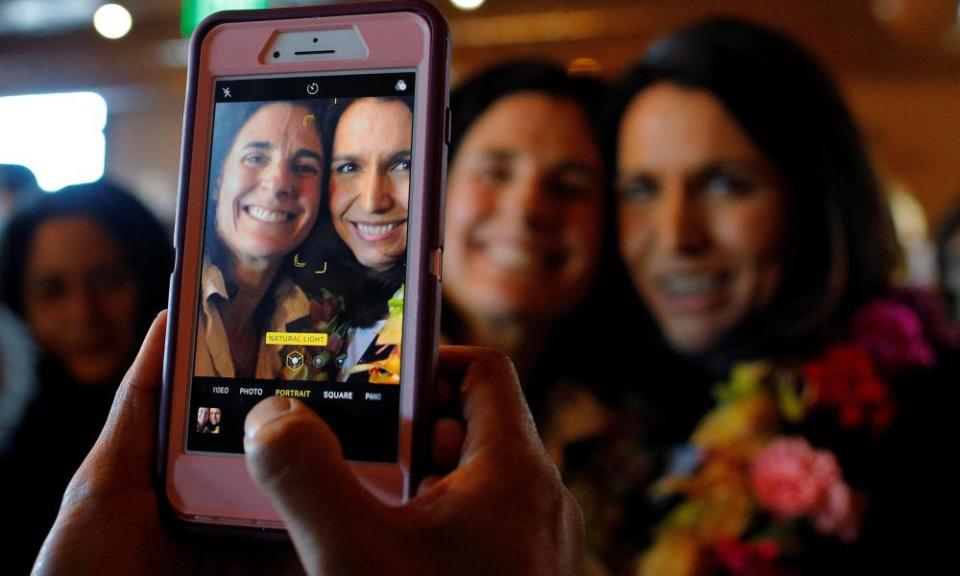
Gabbard poses for a photograph with a diner at the Green Elephant in Portsmouth, New Hampshire, on 17 February 2019.Photograph: Brian Snyder/Reuters
Her political rise was interrupted in 2003, after the US-led invasion of Iraq, when she joined the Hawaii army national guard.
Gabbard volunteered for a 12-month deployment to Iraq, where she served in a combat zone as a medical operations specialist and a military police officer. After graduating with distinction from the Alabama military academyʼs officer candidate school, she signed up for a second deployment, to Kuwait.
Gabbard describes her military service as a life-changing moment. There were personal consequences, including the dissolution of her first marriage, which she has attributed to the duress of overseas deployment. She credits her deployment with shaping her foreign policy views. It also, she says, changed her mind about other things.
‘I can’t marry my dog!’
“My first encounter with Tulsi was on those TV commercials,” said Michael Carver, a Hawaiian Aids activist and HIV survivor. He is referring to a campaign against same-sex marriage starring Mike Gabbard, Tulsi’s father, in 1998, when Gabbard was 17 and the state was weighing a constitutional amendment upholding a same-sex marriage ban.
The TV ads were part of a larger public relations campaign “criticizing and degrading homosexuals and how awful they were, what disgusting perverts they were”, said Carver.
In one TV ad that Tulsi Gabbard appeared in, her father, arguing against same-sex marriage, says, “For example, I’m not allowed to marry my daughter, or my son.” Then a surfer runs by and says, “And I can’t marry my dog!”
“Don’t open the door to weird marriages,” Mike Gabbard concludes.
Tulsi Gabbard has repeatedly apologized for her past attacks on the LGBT community, in personal videos and, most recently, on national TV.
“I was raised in a very socially conservative home,” Gabbard said recently on CNN. “My father is Catholic, he was a leading voice against gay marriage in Hawaii during that time. Again I was very young, but these were the values and beliefs that I grew up around.”
Gabbard’s attacks on the LGBT community lasted at least until 2004, when, as a 23-year-old state legislator, she led, with speeches and demonstrations, a successful fight against a bill that would have created civil unions in Hawaii for same-sex couples and a separate fight against anti-bullying legislation.
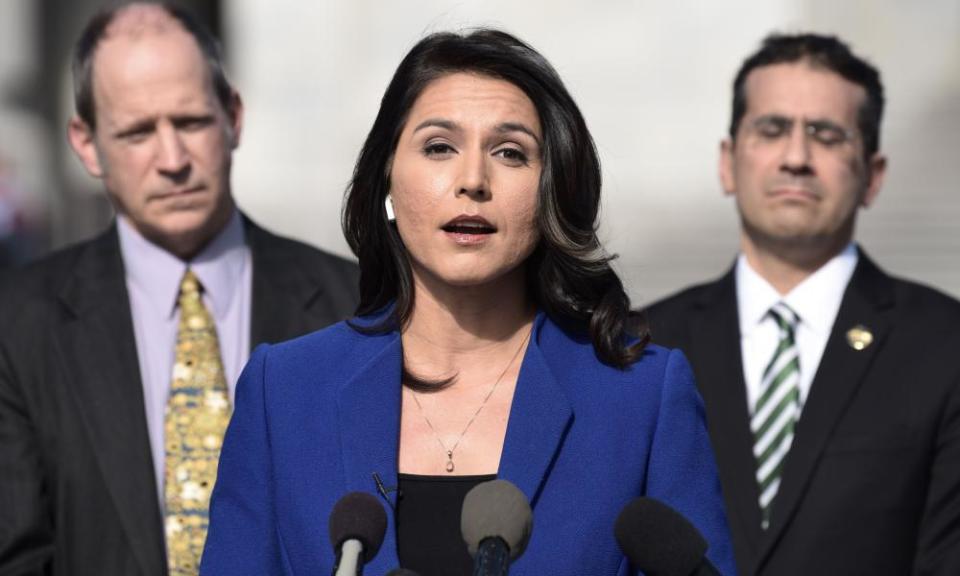
Gabbard is running for president on a platform that appears at a glance to match that of any other Democrat circa 2020.Photograph: Eric Baradat/AFP/Getty Images
“To try to act as if there is a difference between ‘civil unions’ and same-sex marriage is dishonest, cowardly and extremely disrespectful to the people of Hawaii,” Gabbard told the committee introducing the civil unions bill. “As Democrats we should be representing the views of the people, not a small number of homosexual extremists.”
Golojuch said he was stunned at the time by Gabbard’s vehemence.
“She got up there and she torched [committee chair Eric] Hamakawa and the entire committee for even hearing the bill, called them disgraceful,” said Golojuch. “And it wasn’t the actions of somebody who was doing these because they were forced to.
“She got glee out of it. There was a rancor and a glee in her voice.”
Emails and phone calls to Gabbard’s Washington office and to her 2020 campaign were not returned.
Related: Donald Trump meets with prominent Sanders supporter Tulsi Gabbard
But Gabbard has repeatedly described an “evolution” on same-sex marriage akin to that undergone by Obama and Clinton. She attributes her evolution to her time in the Middle East, when she said she saw the “negative impact of a government trying to act as a moral arbiter for the people”.
“These experiences caused me to go through some soul-searching myself,” she said on CNN. “And so I ask you to look to my record in Congress now for over six years, where it is a reflection of what is in my heart, and it is a reflection of my commitment to fight for equality for all people.”
Gabbard has pointed out that she has earned a 100% rating from the Human Rights Campaign and that she was endorsed in 2012 by the Equality Hawaii Action Fund, which said, “We believe in Gabbard’s commitment to our community, and to helping heal and move our state forward on issues of marriage equality.” Earlier this month, Gabbard cosponsored legislation in Congress to prohibit discrimination on the basis of sexual orientation and gender identity.
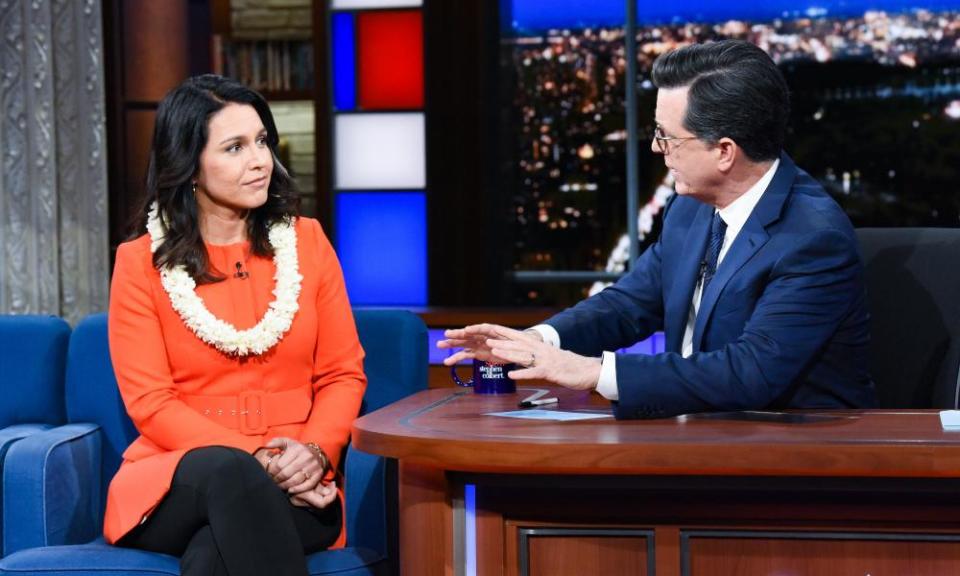
Gabbard on the The Late Show with Stephen Colbert on 11 March 2019.Photograph: CBS Photo Archive/CBS via Getty Images
But activists in Hawaii say she has not done enough to repair the harm she caused.
“She’s never had any contact with our community here, she’s never participated in any gay pride events or worked with LGBTQ youth to help affirm that they are an acceptable part of society,” said Carver. “She’s done nothing with the gay community. And I think if she was sincere in that apology, she would be reaching out to try and repair the damage that she did.”
‘Underestimated’
When Gabbard returned from Iraq, she picked up where she left off, winning difficult political races and surprising more experienced opponents. “Tulsi Gabbard throughout her career has often been underestimated,” said Moore.
Accordingly, when Gabbard blazed into Congress in early 2013, Washington sat up and took notice.
But at times, Gabbard has seemed more at home with Republicans than with her own party. Even before she baled on Clinton, Gabbard emerged as a hero on the right for going on Fox News, repeatedly, to boost the network’s line that Obama’s refusal to use the phrase “radical Islamic terror” amounted to a fatal failure of leadership. “In my opinion, it really is not recognizing that Islamic extremism is the enemy,” Gabbard said in one appearance. Delighted that an elected Democrat was willing to bash the president, the Fox host Tucker Carlson has repeatedly singled Gabbard out for praise.
By April 2015, the conservative National Review was all in, publishing a profile titled, “Meet the Beautiful, Tough Young Democrat Who’s Turning Heads by Challenging Obama’s Foreign Policy.” “I like her thinking a lot,” Arthur Brooks, the president of the conservative American Enterprise Institute, was quoted as saying. “She could be a very powerful new voice on the D side.”
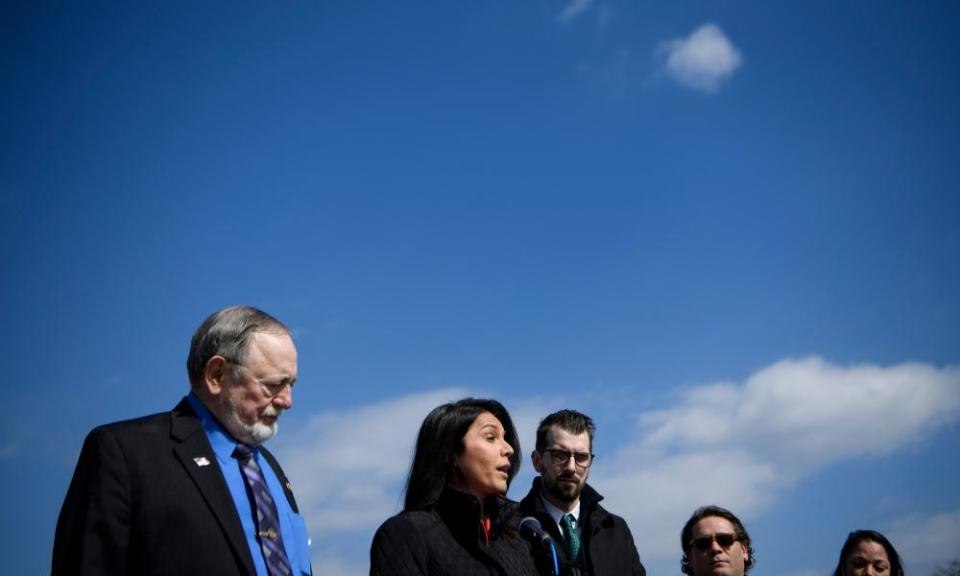
Gabbard, and Don Young, Republican congressman of Alaska, announce bipartisan marijuana legislation in March 2019 in Washington DC.Photograph: Brendan Smialowski/AFP/Getty Images
The words are warmer than some of what Gabbard hears from her own party – and has for them. In January, Gabbard published an op-ed in the Hill newspaper attacking Democratic senators, including a colleague from the Hawaii delegation, Senator Mazie Hirono – although not by name – for using a confirmation hearing to question a Trump judicial appointee, Brian Buescher, about his anti-abortion views and his membership in the Knights of Columbus, a Catholic fraternal organization that has organized opposition to same-sex marriage. Gabbard’s op-ed accused the Democrats of “fomenting religious bigotry”.
In reply, a Hirono spokesman said: “It is unfortunate that Congresswoman Gabbard based her misguided opinion on the far-right wing manipulation of these straightforward questions.” Asked soon afterwards about Gabbard’s presidential bid, Hirono alluded to Gabbard’s past spotty record as a progressive and said, “I wish her well.”
Related: Immigration and gay rights: Gillibrand and Gabbard questioned on past views
Some read the Gabbard op-ed as a canny way for the candidate to pre-empt questions about her own religious background, and as a play for attention in a crowded Democratic field. But that’s not how Moore, the political science professor, read it.
“I think some people would say that a lot of what Tulsi Gabbard does is just pure political calculation,” Moore said. “But I wouldn’t agree with that. I think her positions on foreign policy really do come from her experience as a veteran.
“And I do think her experience of being part of a religious minority really does make her sensitive to any suggestion of using people’s spiritual and religious beliefs as a political weapon, as they have been against her on occasion. I think those come from a genuine place for her, and in some ways, as a result of that, she’s probably made some unforced errors.
“But I think that’s also something people respect about Tulsi Gabbard.”

